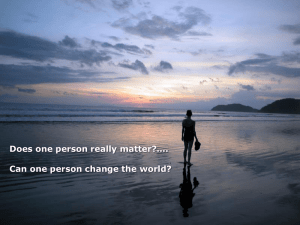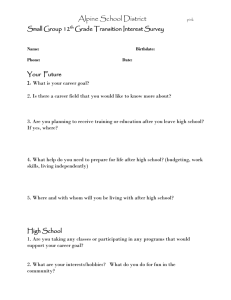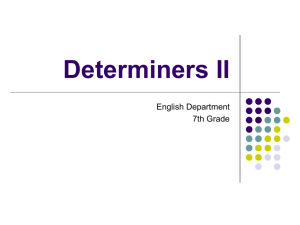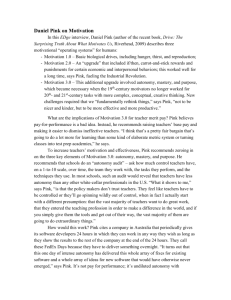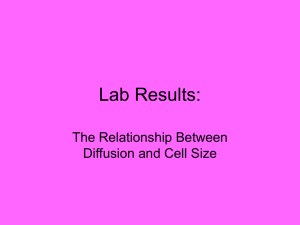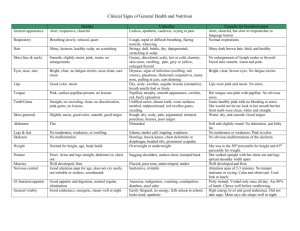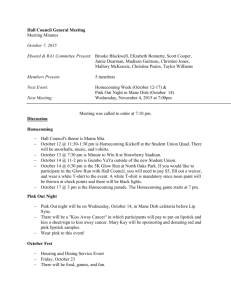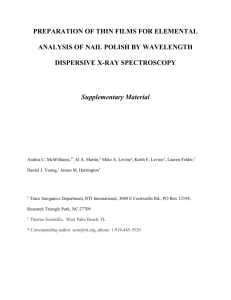wikispace outline examples
advertisement
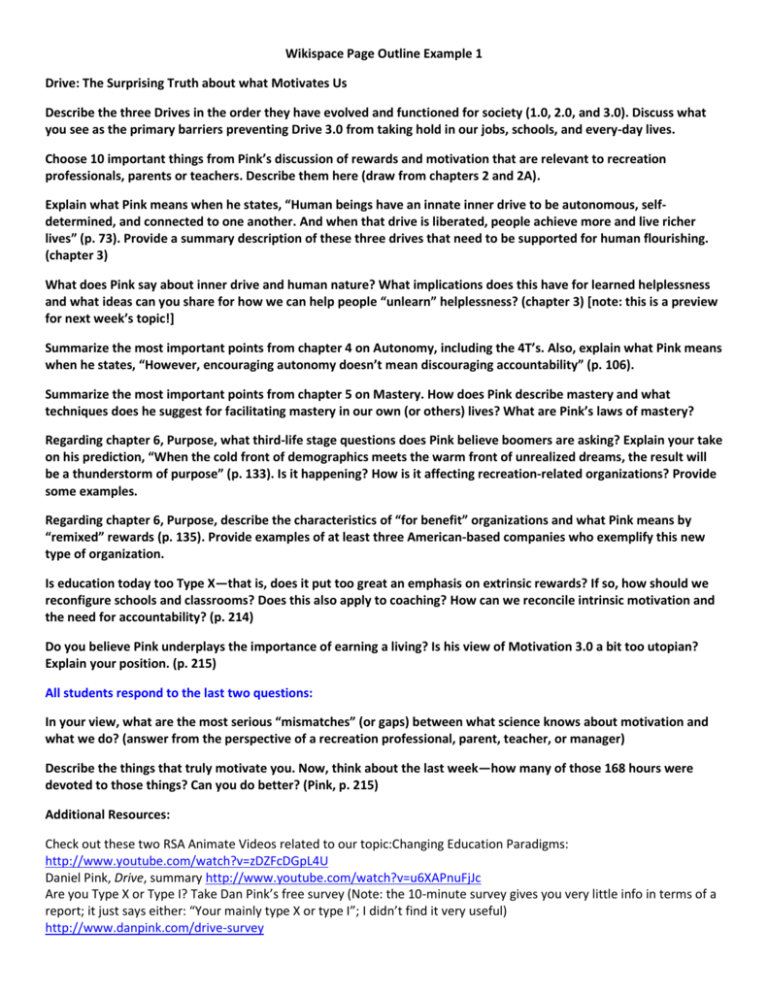
Wikispace Page Outline Example 1
Drive: The Surprising Truth about what Motivates Us
Describe the three Drives in the order they have evolved and functioned for society (1.0, 2.0, and 3.0). Discuss what
you see as the primary barriers preventing Drive 3.0 from taking hold in our jobs, schools, and every-day lives.
Choose 10 important things from Pink’s discussion of rewards and motivation that are relevant to recreation
professionals, parents or teachers. Describe them here (draw from chapters 2 and 2A).
Explain what Pink means when he states, “Human beings have an innate inner drive to be autonomous, selfdetermined, and connected to one another. And when that drive is liberated, people achieve more and live richer
lives” (p. 73). Provide a summary description of these three drives that need to be supported for human flourishing.
(chapter 3)
What does Pink say about inner drive and human nature? What implications does this have for learned helplessness
and what ideas can you share for how we can help people “unlearn” helplessness? (chapter 3) [note: this is a preview
for next week’s topic!]
Summarize the most important points from chapter 4 on Autonomy, including the 4T’s. Also, explain what Pink means
when he states, “However, encouraging autonomy doesn’t mean discouraging accountability” (p. 106).
Summarize the most important points from chapter 5 on Mastery. How does Pink describe mastery and what
techniques does he suggest for facilitating mastery in our own (or others) lives? What are Pink’s laws of mastery?
Regarding chapter 6, Purpose, what third-life stage questions does Pink believe boomers are asking? Explain your take
on his prediction, “When the cold front of demographics meets the warm front of unrealized dreams, the result will
be a thunderstorm of purpose” (p. 133). Is it happening? How is it affecting recreation-related organizations? Provide
some examples.
Regarding chapter 6, Purpose, describe the characteristics of “for benefit” organizations and what Pink means by
“remixed” rewards (p. 135). Provide examples of at least three American-based companies who exemplify this new
type of organization.
Is education today too Type X—that is, does it put too great an emphasis on extrinsic rewards? If so, how should we
reconfigure schools and classrooms? Does this also apply to coaching? How can we reconcile intrinsic motivation and
the need for accountability? (p. 214)
Do you believe Pink underplays the importance of earning a living? Is his view of Motivation 3.0 a bit too utopian?
Explain your position. (p. 215)
All students respond to the last two questions:
In your view, what are the most serious “mismatches” (or gaps) between what science knows about motivation and
what we do? (answer from the perspective of a recreation professional, parent, teacher, or manager)
Describe the things that truly motivate you. Now, think about the last week—how many of those 168 hours were
devoted to those things? Can you do better? (Pink, p. 215)
Additional Resources:
Check out these two RSA Animate Videos related to our topic:Changing Education Paradigms:
http://www.youtube.com/watch?v=zDZFcDGpL4U
Daniel Pink, Drive, summary http://www.youtube.com/watch?v=u6XAPnuFjJc
Are you Type X or Type I? Take Dan Pink’s free survey (Note: the 10-minute survey gives you very little info in terms of a
report; it just says either: “Your mainly type X or type I”; I didn’t find it very useful)
http://www.danpink.com/drive-survey
Wikispace Page Outline Example 2
Social and Environmental Justice
All students respond to these first two questions [Note, the answers to these questions must be based on content
from assigned readings, class discussion and review of other credible resources]:
[1] Create/endorse your own definition of social justice (you can define “social and environmental justice” if you
prefer)
[2] Should recreation professionals focusing on helping people through director service, or is it also our job to help
change society? Explain.
Choose one of the following questions to respond to [Note, these are opinion questions, but you need to justify your
opinions]:
{option 1}: Respond to David Gray’s question: What does society need done and how can we do it? (in your answer
consider things like the role of recreation in meaningful societal change; mother’s leisure, marginalized populations;
environmental justice)
{option 2} Do you believe there is a standard for social justice or is it relative and subjective? If there is a standard,
how do we know what it is?
Additional Resources:
Social Justice on Wikipedia—view definition, criticism, healthcare and education
http://en.wikipedia.org/wiki/Social_justice
I Will Survive Capitalism at Oakland General Strike
The Nov. 2, 2011 Oakland General Strike (3:25)
http://www.youtube.com/watch?v=P-4QsWJp4Sw
Mothers and Children in the U.S.
A short clip from the “Motherhood Manifesto” by Momsrising.org (2:20)
http://www.youtube.com/watch?v=17x235VynTY
Environmental Justice
“Majora Carter’s Tale of Urban Renewal” (18:33) portrays and emotionally charged talk by MacArthurwinning activist Majora Carter gives the details of her fight for environmental justices in the South
Bronx. She illustrates how minority neighborhoods suffer most from flawed urban policy and how
communities can come together to address these problems.
http://www.ted.com/talks/lang/eng/majora_carter_s_tale_of_urban_renewal.html
